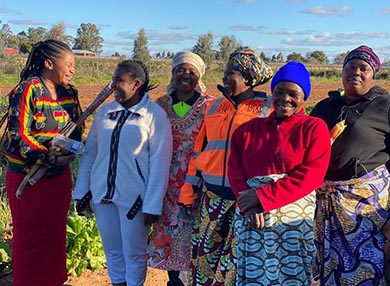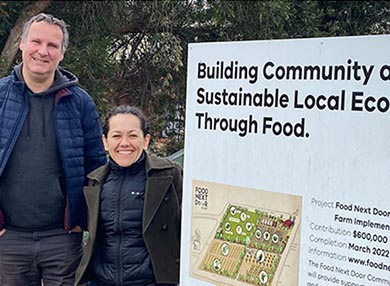Improving financial, business and leadership skills in women of refugee backgrounds.
Empowering refugee women through farming
New country. New culture. New ways to grow food in a completely different geographical and social environment.
These challenges are faced by African women with refugee backgrounds, living in regional Australia building farming and food businesses in their new communities.
An initiative to build business acumen has addressed barriers to their success, delivered by Macquarie Business School and partners. The social entrepreneurship approach ensured new skills could also be shared with other women in their community and provide to many families in the region beyond the initial participants through a ripple effect.
Barriers may not be easily visible but are real. The Food Moves Skills program, involving Professor Stefan Trueck and Dr Fabiola Barba Ponce from the Department of Actuarial Studies and Business Analytics, focused on providing leadership, financial literacy and business mentorship, with the aim of improving financial stability, mental health and social integration of African women farmers with refugee backgrounds.

Specifically, it reduced skill and capability gaps among the female migrant farmers growing their market garden businesses. This included broad education on basic financial skills through to specific practical information. It provided information on many topics, from business planning and record keeping to how the banking and tax systems work.
Borrowing money, interest rates, insurance and even buying shares to invest money safely were part of the wide-ranging program to support this group of women to establish firm foundations. The goal was to facilitate sustained growth and financial security for their families through improved work and life readiness as they developed capacity to scale their businesses.
In addition to the financial literacy elements provided through mentorship from Professor Trueck, Dr Barba Ponce focused on the psychology of transition, entrepreneurship and leadership.

One of the participants, Joselyne Ntahomvukiye who lives in Mildura but came to Australia from Burundi in East Africa, transitioned from: “I don’t have personal financial goals” to “Knowing some ways (that) may help me to make an income. To lead other women in this project with confidence”.
“I was able to learn project planning which gave me the opportunity to continue by myself with projects I have,” Ms Ntahomvukiye says.
It also provided guidance on regenerative farming practices and addressed climate change and land misuse in regions like Mildura and Nowra, where the women were located, so they could successfully produce food crops from their home countries, including white eggplant, maize, lenga lenga and other specialist produce both for sale and personal use.
The two-year project, Improving Financial, Business and Leadership Skills in Women of Refugee Background, which delivered the Food Moves Skills into Migrant Women program, was funded by the Ecstra Foundation, in partnership with Food Next Door Coop, and the Co-Op Federation.
Culturally sensitive material and resources contributed to success. This included translation into Swahili to assist those whose English skills were still emerging, supported by additional funding by the Lord Mayor’s Charitable Foundation through the Eldon & Anne Foote Trusts Grants program.
The combination of sustainable business practices, community empowerment and consideration of environmental factors fostered economic independence for lasting impact on the wellbeing and integration of migrant communities, contributing to meaningful long-term change.
This was demonstrated by the three original mentees becoming mentors, sharing knowledge and inspiring an additional 10 women to launch their own businesses through peer-to-peer learning and practical on-site training, further expanding the project’s positive outcomes.
And in a further update, Ms Ntahomvukiye has since enrolled in a Bachelor of Arts in Social Work at La Trobe University.
“Before the program, I never believed I deserved to go to university. But the modules, the computer classes, your support, and learning how to pitch my business helped me build the self-trust and confidence I needed to pursue my degree,” she said.